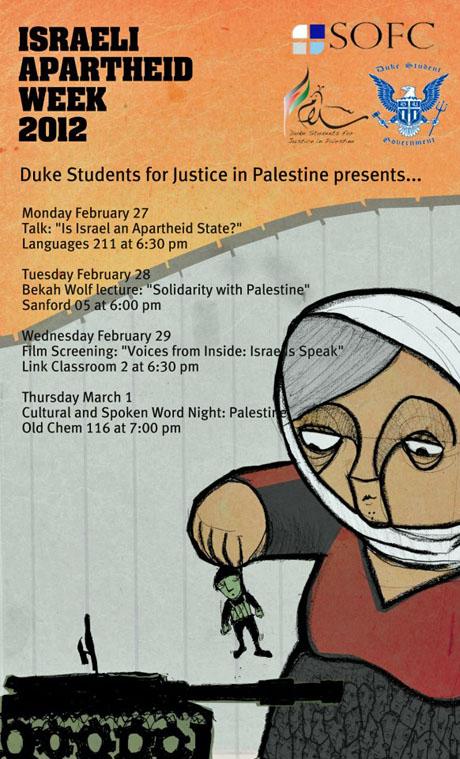The Chronicle
The Independent Daily At Duke University
No student funds for ignorant rhetoric
http://dukechronicle.com/article/no-student-funds-ignorant-rhetoric
By Editorial Board | February 28, 2012
The nationwide Israeli Apartheid Week has made its way to Duke University and announced its presence in incendiary fashion. Duke Students for Justice in Palestine, the sponsoring group, has publicized the week’s programming with posters that appear to depict an old Jewish woman—gargantuanly proportioned, crudely drawn and invoking, whether purposefully or not, old Jewish stereotypes—whimsically lifting and peering inquisitively at a miniature Palestinian soldier. We, undoubtedly alongside more than a few fellow students, find these images to be quite unsettling—even if the poster’s creators intended something else entirely. At best, the poster is distasteful, needlessly caricaturing a historically malicious form of representation; at worst it can be regarded as anti-Semitic. These advertisements never should have seen the light of day.
The Israeli Apartheid Week is partially funded by the Student Organization Finance Committee, which performs its eponymous task under the purview of Duke Student Government. Accordingly, the Israeli Apartheid Week posters bear the student government and SOFC official logos. SOFC’s purse is filled by student activity fees, and DSG represents the student body. As such, these organizations should remain especially vigilant about what printed materials bear their logos. Whether or not SOFC paid specifically for the printed materials, we are disappointed that such a patently offensive picture slipped through SOFC’s auditing arm. Although it may be logistically unfeasible for SOFC to oversee funding minutiae, we urge the committee to better scrutinize the content of printed materials depicting its signature.
But perhaps even more importantly, these purposefully inflammatory posters undermine any legitimate attempt on DSJP’s part to foster campus discourse about the relevant issue. Indeed, Israel-Palestine discussions are heated—many individuals already are too embarrassed or fearful to engage in meaningful dialogue. What purpose does adding fuel to the fire serve, other than further marginalizing on-the-fence students? This particular method of communication is counterproductive to the cause.
This controversy naturally raises the question of whether the week’s festivities should have even received SOFC funding. After all, should student fees endow a politically charged movement? We think so. Although the views advanced by Israeli Apartheid Week may rub some students the wrong way, our University’s intellectual climate critically hinges upon such events. Israeli Apartheid Week, however extreme its position, forces us to think meaningfully about a conflict that might not be at the forefront of our minds. Moreover, the matter boils down to a free speech issue. If we do not allow Duke Students for Justice in Palestine to voice their views, at what point would the restrictions end? Should we prohibit Duke College Republicans from putting together a conservative speaker series? Or disallow the Lesbian, Gay, Bisexual and Transgender Center from organizing Coming Out Day?
Of course, the answer to these questions is ‘no.’ Instead, a suitable method of tempering a politically charged event is encouraging a discursive space in which students with competing viewpoints can freely share them. Student groups that might have a problem with Israeli Apartheid Week can host an alternative series of events to publicize their opposing stances. We are outraged solely at the printing of offensive material bearing the SOFC and DSG imprint. The onus is on SOFC and DSG to prevent such an incident from recurring.

